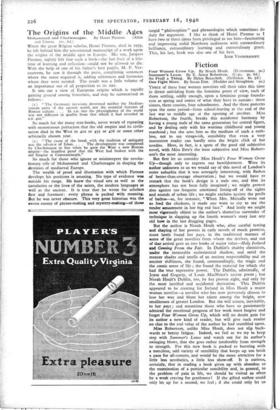The Origins of the Middle Ages
Mohammed and Charlemagne. By Henri Pirenne. (Allen and Unwin. mi. 6d.)
WHEN the great Belgian scholar, Henri Pirenne, died in 1935,
he left behind him the uncorrected manuscript of a work upon the origins of the middle ages in Europe. His son, Jacques
Pirenne, rightly felt that such a book—the last fruit of a life- time of learning and reflection—could not be allowed to die. With the help of one of his father's best pupils, M. F. Ver-
cauteren, he saw it through the press, completing sentences where the sense required it, adding references and footnotes where they were needed. The result was a little volume of an importance out of all proportion to its size.
It sets out a view of European origins which is rapidly gaining ground among historians, and may be summarised as follows:
(i.) " The Germanic invasions destroyed neither the Mediter- ranean unity .4 the ancient world, nor the essential features of Roman culture. . . In A.D. 60o the physiognomy of the world was not different in quality from that which it had revealed in A.D. 400."
So much for the many text-books, never weary of repeating with monotonous psittacism that the old empire and its civili- sation died in the West in 4to or 455 or 476 or some other arbitrarily chosen year.
(2.) " The cause of the break with the tradition of antiquity was the advance of Islam. . . . The development was completed by Charlemagne in 80o when he gave the West a new Roman empire—the manifest proof that the West had broken with the old Empire at Constantinople."
So much for those who ignore or misinterpret the revolu- tionary role of Mohammed and Charlemagne in shaping the destinies of mediaeval Europe.
The wealth of proof and illustration with which Pirenne develops his positions is amazing. No type of evidence was outside his range. He knew the visual arts as well as the cartularies or the lives of the saints, the modem languages as well as the ancient. It is true that he wrote for scholars
first and foremost: every phrase is packed with meaning.
But he was never obscure. This very great historian was the sworn enemy of phrase-making and mystery-making—of those turgid " philosophies " and phraseologies which sometimes do duty for argument. I like to think of Henri Pirenne as I have two or three times been privileged to see him—fascinating and impressing stolid Northern audiences with extraordinary brilliance, extraordinary learning and extraordinary grace. This, his last, book was also one of his best.
IGOR VINOGRADOFF.






































 Previous page
Previous page